When you are looking for weekends in Devon, there is so many places to explore. Sitting in the southwest of England, Devon stretches from Ilfracombe in the north to Salcombe in the south. Unusually, Devon has two stretches of coastline; the Atlantic coast on the north and the English Channel on the south.
From stunning sandy beaches to fossil-filled cliffs of the southern Jurassic Coast, towns dating back to the Middle Ages and wild moorland in the national parks, the epic South West Coast Path and plenty of water sports, there are lots of things to do in Devon.
*This site uses affiliate links and I may earn a small commission when you use my links and make a purchase without incurring an additional fee yourself.
Thank you for supporting this website. See my disclaimer page for more details.
Both North Devon and South Devon are designated Areas of Outstanding Natural Beauty (AONB). AONBs are nationally protected areas protected to maintain and preserve the magnificent beauty of their landscapes.
If you are a walker join the South West Coast Path at the various towns and villages along the way. The views are amazing across the south west coast of the English Channel and great way to spend a holiday in Devon.
I asked fellow travel bloggers to recommend their favourite weekend in Devon and tell us a bit about what you can do there. Let’s dive into some of the best weekends in Devon.
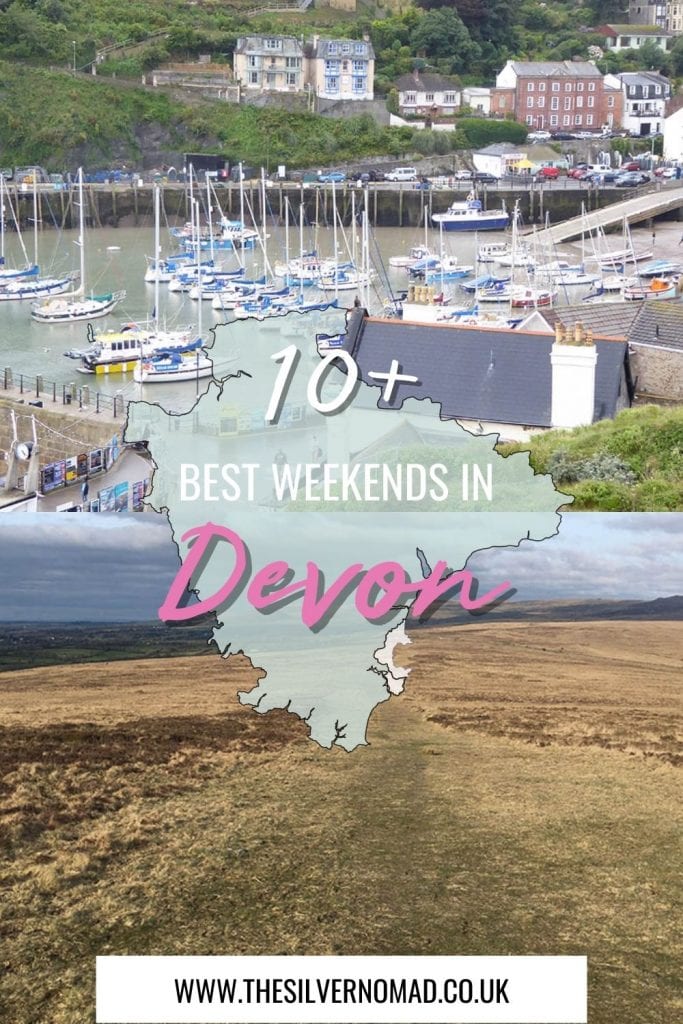
Best weekends in Devon
Woolacombe and Croyde

Woolacombe is justifiably famous as the home of Britain’s best beach. Croyde, meanwhile, is just down the road, and popular with surfers from all over the UK. The two North Devon resorts make a great destination for a short break or longer holiday in this beautiful area.
Woolacombe is popular with families as well as anyone who loves beach life. Accommodation here comprises around half-a-dozen caravan parks as well as campsites, hotels, bed and breakfast and self-catering properties. As well as the vast, golden sandy beach, there are some decent surf shops in both places plus a range of welcoming pubs and cafes.
Bodyboarding and surfing are hugely popular in these parts, and both beaches are generally busy during summer with both children and adults taking to the waves. Woolacombe beach tends to be the top destination for families, while Croyde is where anyone serious about surfing will head for.
Croyde’s beach can be reached via a pleasant stroll from the charming village. A footpath that begins behind one of the pubs leads through the countryside directly to Ruda, Croyde’s only caravan park – and the beach just beyond. By contrast, the resort of Woolacombe is right by the sea.
Both Croyde and Woolacombe offer the best of British beach life, and if you’re staying in one you’re unlikely to want to miss checking out
the other.
by Polly Taylor from Let’s Travel UK
Dartmouth
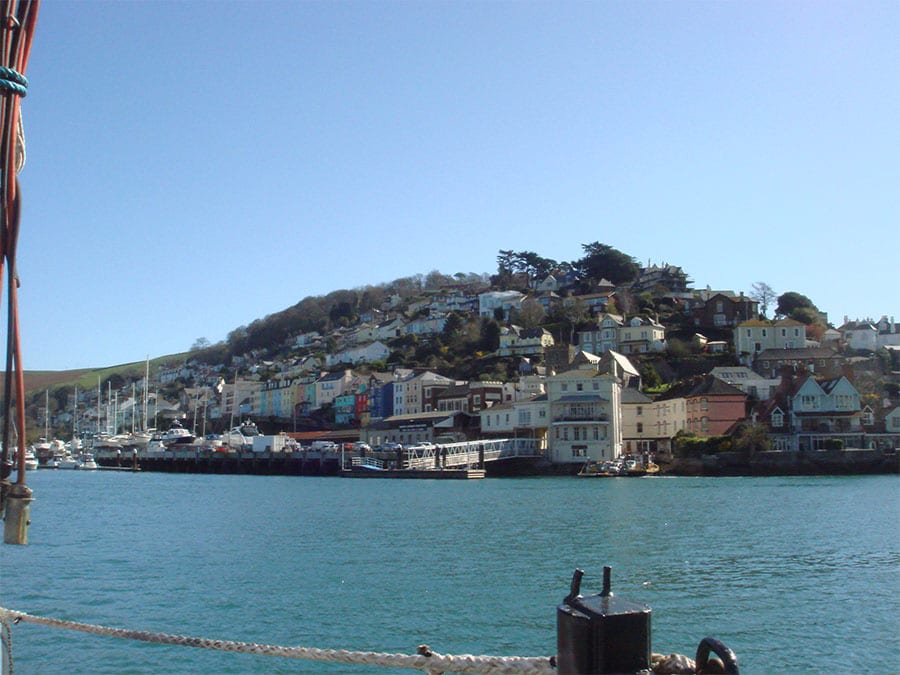
For a relaxing weekend in Devon visit the pictures town of Dartmouth. Tucked inland on the banks of the Dart Estuary, Dartmouth is in the South Devon Area of Outstanding Natural Beauty.
Dating back to the mid 12th Century, the town has kept many of the original features. The cobbled quay at Bayards Cove and the 16th Century timber-framed buildings in Butterwalk are beautiful reminders of a bygone time. The colourfully painted houses of Dartmouth wind their way up the hill with wide-stepped alleyways and lanes to wander around.
On the mouth of the Estuary sits Dartmouth Castle. Built in the late 1300s, not only did it protect the port of Dartmouth from attacks by the French, it is also in a beautiful situation. Visit the castle where you can trace its long history, various extensions and enjoy the views over the English Channel.
If you enjoy water sports, there is plenty to do in Dartmouth and the south Devon coastline. Take to the waters in a kayak, canoe, paddleboard or surfboard. You can hire them or bring your own and launch from one of the beaches. If you fancy a more leisurely time on the water, there are many boat trips you can take.
Don’t miss the two big festivals in Dartmouth. The exciting Port of Dartmouth Royal Regatta in late August brings together competitors from around the world who take part in the thrilling races. There is also sports, live music, street food and fireworks to enjoy. In October enjoy the Food Festival with over 100 producers from the South West showing off their culinary skills and produce.
by Larch from The Silver Nomad
Babbacombe
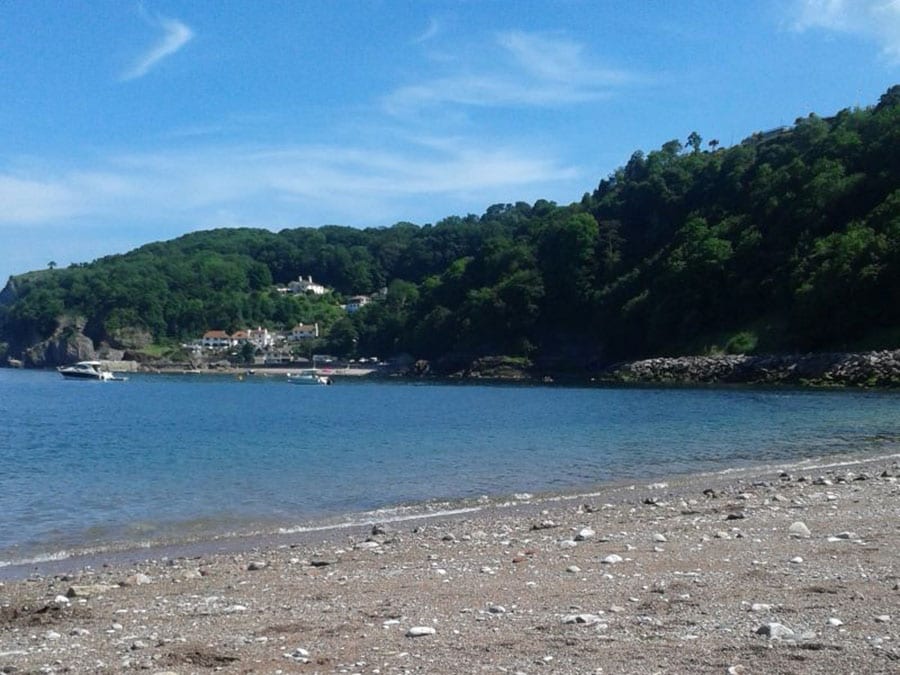
Babbacombe is a small town near Torquay and is part of the English Riviera. There are lots of places to stay near Babbacombe from small boutique hotels and B&Bs to large family friendly campsites, perfect for a weekend in Devon.
Babbacombe although small, is full of things to do, a must visit for any trip is the Bygones Museum featuring a full Victorian street where you can envisage real life Victorian England. There is also a huge steam railway feature and hundreds of displays of items from years gone by, many of which you may recognise. Babbacombe also has its own theatre which has many shows all year round and is a great asset to the English Rivera.
Babbacombe also has beautiful outdoor spaces including the Victorian cliffside railway down to Oddicombe Beach where you can learn the history of the railway, relax on the beach, or stroll along the coastal path. Visit the Babbacombe Downs for the highest cliff top promenade in England, where on a clear day you can see across the water to Portland Bill in Dorset.
No trip to Babbacombe would be complete without visiting Britain’s largest model village, this award-winning attraction is fantastic and great for all ages. Spot celebrities, laugh at the funny scenes and watch the jokes go over the head of children.
by Steph & Lewis from Book It Let’s Go!
Looking for other weekend destinations, why not try a weekend in Dorset?
Clovelly
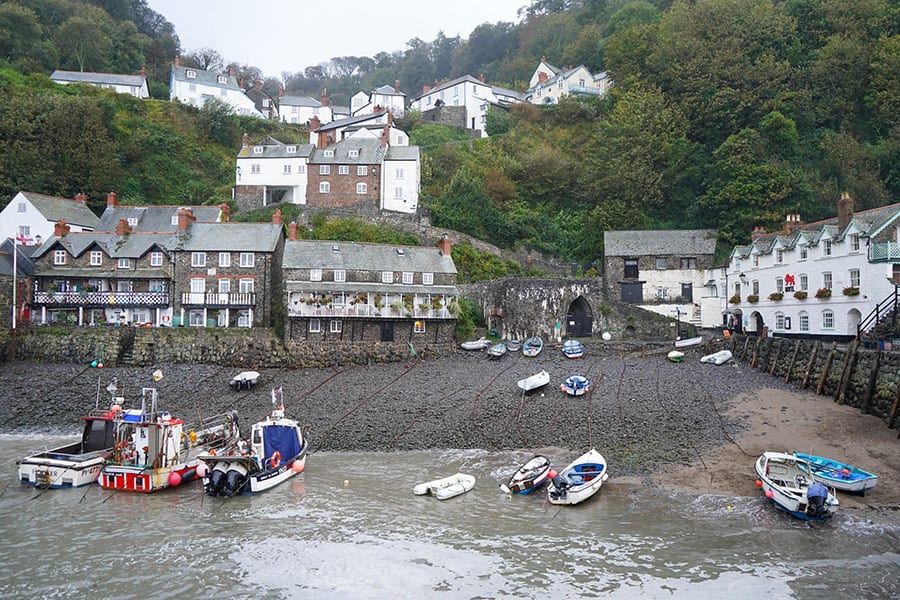
The charming village of Clovelly has a history routed in fishing and tourism. It’s been privately owned since the 13th century and is entirely pedestrianised, with the locals moving their own goods using sledges that they pull up and down the steep and cobbled streets.
Clovelly is carved into the cliff of northern Devon and has a fabulous view of the Bristol Channel. The village descends from the visitor’s centre at the top all the way down to the traversable harbour wall in Clovelly Bay. It’s a key stop for anyone looking to take a Devon road trip.
For a weekend break, there are two hotel options in the village – Red Lion Inn or New Inn Hotel. The Red Lion Inn is an exceptional hotel with incredible views of Clovelly Bay, a fantastic restaurant, and nearby parking (only accessible to guests).
The village includes a museum of a Fisherman’s Cottage. There are boat tours from the harbour. The local tearoom offers a local cream tea and the restaurant at the Red Lion Inn is exquisite.
For visitors that did not stay at one of the local hotels, there is a fee to enter the village, as it is privately owned and maintained, which costs guests £7.75 (Adult) or £4.50 (Child). Car parking is free at the visitor centre.
Tip: If the hike back to the top of the village is too daunting there is a Land Rover service, for a fee, that can carry you back to the top.
By Jamie from Travel Addict
Exeter

Imagine a fairytale village complete with Roman walls, a peaceful river, and a majestic Cathedral. Here you are in Exeter!
Probably inhabited since before the Romans established one of the Imperial armies there, today it is a delightful town nestled on the banks of the River Exe. If you are visiting London it could be an easy extension of your trip. Some trains cover what appears to be a considerable distance on the map in about two hours.
From the station in about 20-25 minutes, you will arrive at The Historic Quay, where on a sunny day you will be fascinated by the relaxed but invigorating air you breathe. You can simply stop for a coffee or continue in the direction of the Cathedral. Passing by some of the remains of the Roman walls you will arrive in the bustling centre of the town.
The Cathedral, with its well-kept garden, is a meeting point for young and old, and often hosts events that involve the whole community. Admission to the Cathedral is subject to charges, but it is worthwhile to appreciate one of the oldest Cathedrals in England and its ceiling with the longest, uninterrupted stretch of Gothic vaults in the world.
Once you have visited the Cathedral, you can join an interesting Red Coat guided tour to appreciate the history of the city. End the day with a relaxing boat trip before enjoying a good night’s rest in the charming Hotel du Vin with every room different and lovely to please everybody.
By Clotilde from A Princess Travelling with Twins
Salcombe
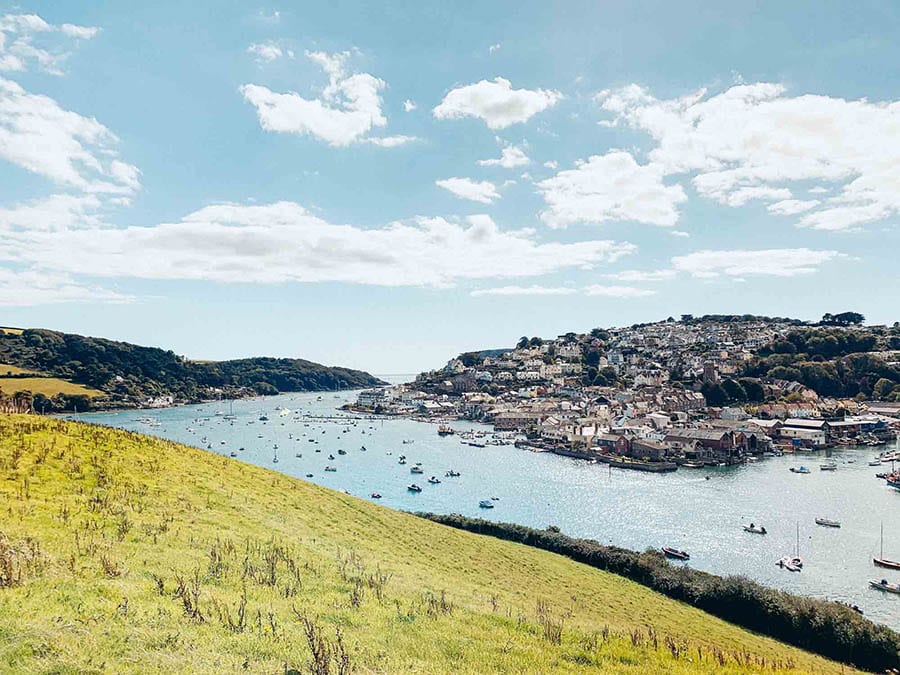
Salcombe is known as one of the UK’s most desirable seaside destinations. It’s a cute harbourside village with epic views, and winding streets filled with cute boutiques, cafes and restaurants.
Situated in the South Devon Area of Outstanding Natural Beauty, the town has sweeping views across the estuary. It’s the perfect place to go for a laidback holiday, enjoying the coastal and countryside setting.
There are plenty of things to do in Salcombe from trying different watersports to spending a day at the beach. And you’ll never be short of refreshments. Don’t miss the delicious ice cream from Salcombe Dairy. And seafood enthusiasts will love The Crab Shed.
Some of the stunning beaches in the area include North and South Sands, Bantham Beach and Hope Cove. And there are plenty of beautiful coastal walks.
Salcombe a popular spot for boating and there are also lots of other watersports to try, including surfing, stand-up paddleboarding and kayaking. For something more sedate, you can also take guided boat trips. A good day trip is to take the ferry across the bay to East Portlemouth, which has a series of lovely bays, plus the excellent Gara Rock Hotel.
By Victoria from Bridges and Balloons
If you can’t get down to Devon, try one of these staycations in England
Ilfracombe
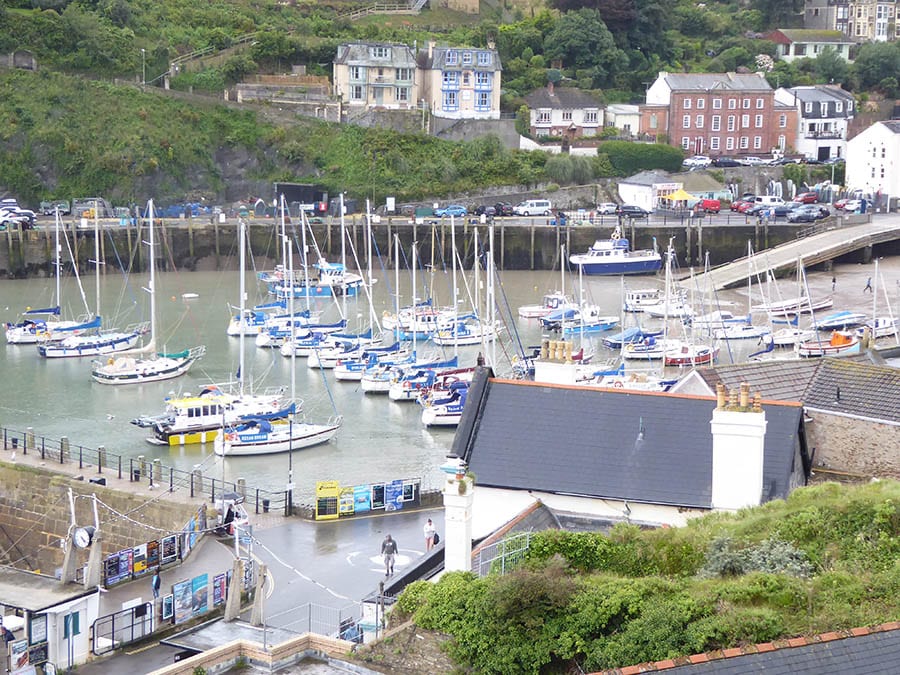
For a relaxing weekend in Devon, head up to Ilfracombe on the north coast. Dating back to Saxon time, Ilfracombe was a favourite seaside resort in Victorian times. It keeps that seaside town feel to it.
One of the most striking attractions of Ilfracombe is the 20 Metre tall bronze statue by Damien Hirst. Holding a sword aloft, “Verity” is an anatomically correct statue of a pregnant woman with a cross-section showing the insides of her skull and the developing foetus inside her womb. A modern depiction of truth and justice with the traditional symbols of a sword and scales, the statue is definitely a topic for discussion and one of the most popular things to do in Devon.
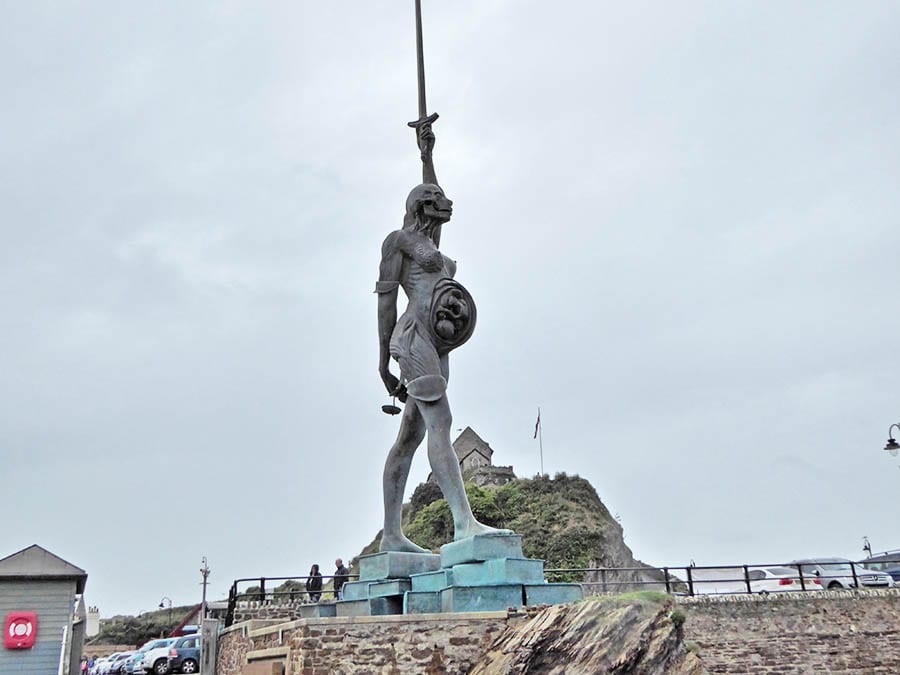
Climb Lantern Hill behind the harbour to take in the amazing views over the town and along the coast. At the top, you can see St Nicholas Chapel which was built in 1361. It is England’s oldest working lighthouse. Part of the South West Coast Path cuts through Ilfracombe with paths through the wooded valley towards The Torrs which has beautiful views across the Bristol Channel.
There are several boat trips you can take from the harbour for sightseeing, fishing, diving and watching the sealife. You can also take a trip across to Lundy Island, a marine conservation area with deer, goats, soay sheep, Lundy ponies, seals and numerous birdlife.
For beaches, head to the Tunnels Beaches. The four tunnels were hand-carved in the 1820s through to the tidal bathing pool and sheltered beaches. The two beaches are shingle and there is an entrance fee to access them. Near to the harbour is Rapparree Cove another shingle beach. When the tide goes out, the beach at Ilfracombe harbour is sandy.
by Larch from The Silver Nomad
Coombe Martin
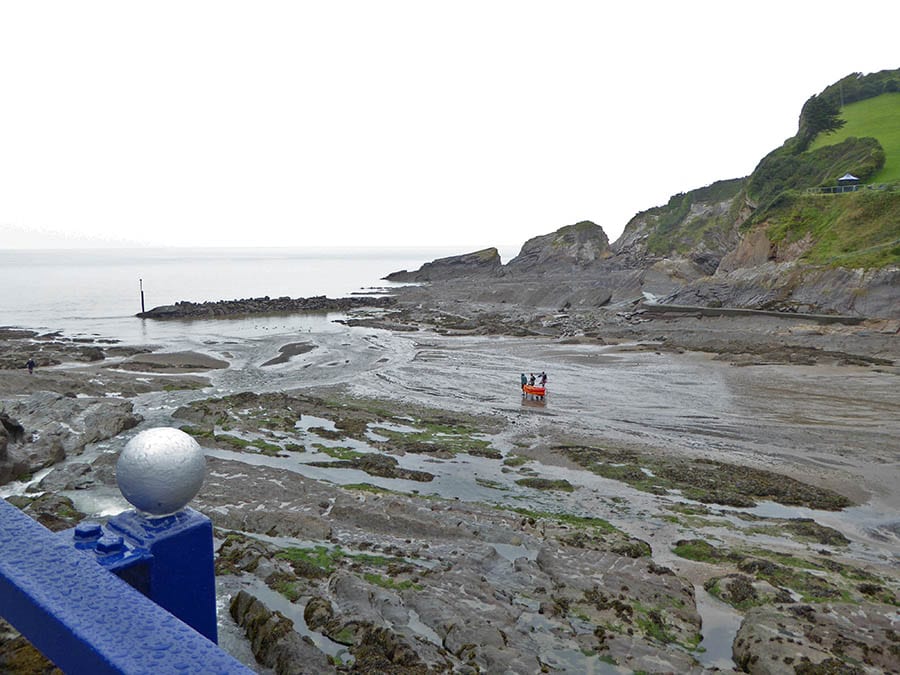
Just along the coast from Ilfracombe is the quieter village of Coombe Martin. Sitting in a valley, the beautiful bay is sheltered and popular with locals and tourists for swimming, kayaking, paddling, rock pooling and sandcastle making!
Visit Coombe Martin museum to discover more about the history of the village including lime quarrying, lead and silver mining. The building also holds the Travel Information Centre. There are pubs and restaurants and as always delicious ice-cream to be tried.
As Coombe Martin is on the South West Coast Path, you can take a walk across to Ilfracombe. The path can be steep in areas, but the views are stunning and well worth the hike.
Stay at the Pack O’ Cards, an intriguing building that was built in 1690. It has 3 floors, 13 rooms and 52 windows. There is a range of accommodation in Coombe Martin including hotels, private rentals and campsites.
During August, the village holds a week-long carnival over the Spring Bank Holiday in May, and the unique ‘The Hunting of The Earl of Rone’. There are processions, music and parties to enjoy.
by Larch from The Silver Nomad
Lynton & Lynmouth
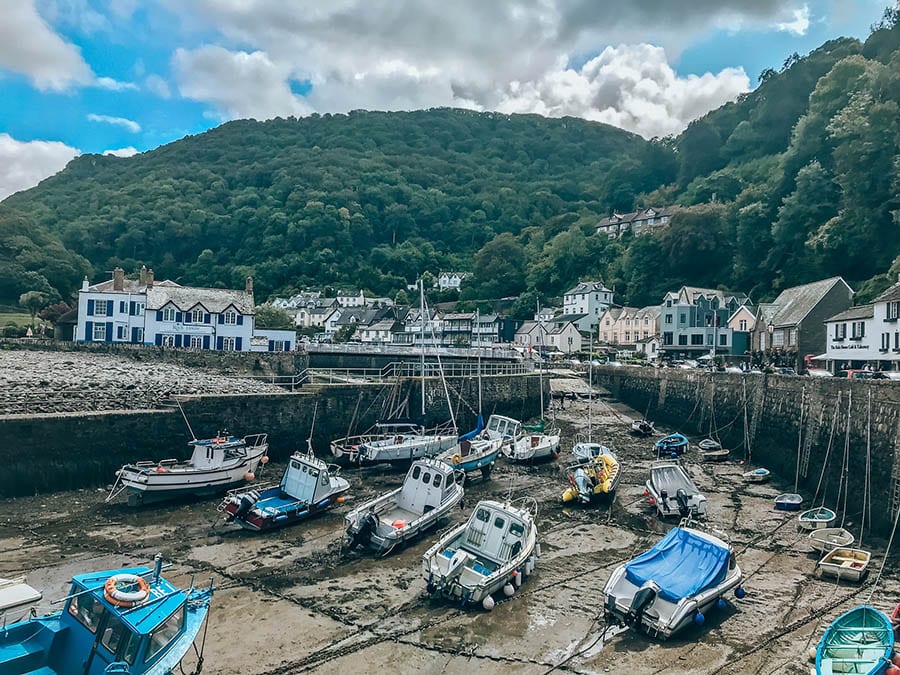
Lynton and Lynmouth’s towns are the perfect Devon locations for a weekend away to explore the incredible coastline. Lynmouth is a cosy seaside town full of independent shops and cafes, it is the ideal place to shop for local art and unique crafts. Lynton sits higher up and straddles the river Lyd.
You can walk from one town to the other, and this path makes up part of the Watersmeet trail, a stunning walk connecting the two towns. This walk is terrific and follows the fast flowing river with many scenic waterfalls. There is also a cafe that offers afternoon tea in a perfect magical setting.
The town of Lynton is known as Little Switzerland. With a spectacular winding river and lush green trees, it is easy to see why. From the towns of Lynton and Lynmouth, you can also visit the Valley of the Rocks. This incredible valley offers some of the most insane views across Exmoor. Lynmouth is also home to the steepest and highest water-powered railway in the world.
It is a great way to view the Exmoor coastline and the beauty of the moors from above. Overall, Lynton and Lynmouth’s towns offer contrasting landscapes within such proximity, making them the perfect destination for a weekend away in Devon.
By Katie from You Me Under the Palm Tree
Exmouth
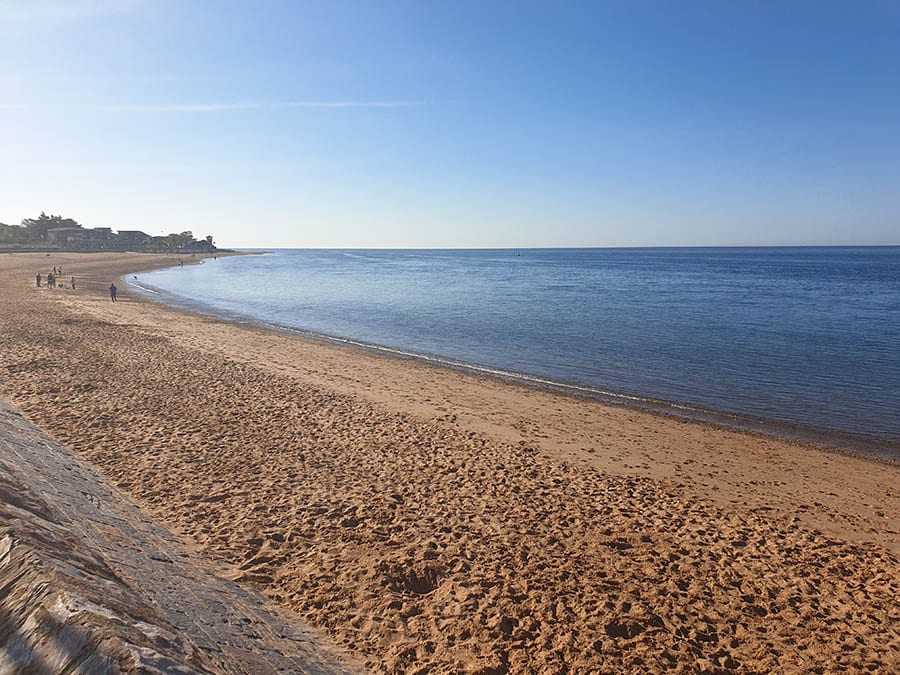
Sitting at the meeting point of the dramatic Jurassic Coast and the Exe Estuary, Exmouth is a wonderful place for a weekend break in Devon. There are so many things to do in Exmouth for people of all ages, especially during the summertime. The main appeal of the town is its large golden sandy beach; it does get busy in the summer, but there’s usually plenty of space for everyone.
To the east of the town is Orcombe Point, which is the official start of the Jurassic Coast. These ancient cliffs are great for fossil hunting or hiking – and you’ll be able to enjoy some spectacular panoramic views from the top. This is part of the South West Coast Path, and you can hike from here to the next town – Budleigh Salterton – and beyond.
It’s also worth taking a walk or drive along the Exe Estuary. The calm waters here are ideal for stand up paddleboarding, or you could just enjoy the river views and do a spot of birdwatching. The smaller villages of Lympstone, Exton and Topsham are all very charming and hiking-distance from Exmouth.
Away from the coast, Exmouth has some wonderful nearby inland attractions. A La Ronde is a National Trust property; an 18th century 16 sided house which is the perfect place to visit on a rainy day. You can also hike on the enigmatic moorland, or drive to historical villages like East Budleigh or Otterton, which has an interesting mill and a river with resident beavers.
East Devon is a wonderful part of the country, and Exmouth is an ideal base to see it from!
By Claire from Go South West
Tavistock
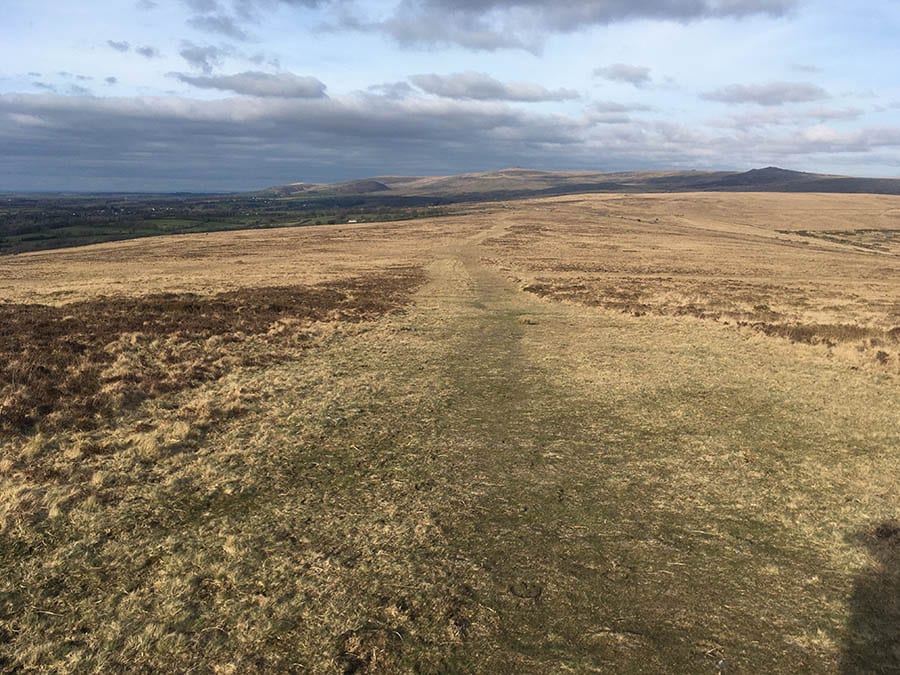
The river Tavy runs through Tavistock and gave this bustling market town its name. It’s the biggest town in West Devon and is a great place to spend a weekend in Devon.
The town has had a recorded history since 961 when Tavistock Abbey was founded, you can still see the ruins in the centre of town, but it’s another abbey close by that is more famous. Buckland Abbey was once the home of Tavistock’s most famous son, Sir Francis Drake. The property remained in his family until 1946 when it was sold and came under the stewardship of the National Trust.
National Trust members have plenty of options when spending a weekend in Tavistock, there are a further four properties in the area to visit. In the town centre, the Pannier Market has housed a weekly market since 1105 – named after the baskets that were used to transport goods, this covered hall has stalls every day apart from Monday, and it’s a great place to shop for local produce and artisan goods alike.
It is, however, Dartmoor that is the main draw to spending time in Tavistock, which sits at the western boundary of this National Park which covers 954 square kilometres and allows free-roaming, meaning you don’t need to stick to the marked trails. It’s best to start at the National Park visitor centre at Princetown, and don’t miss the iconic semi-wild Dartmoor ponies which roam free on the moor.
By Sarah from A Social Nomad
Westward Ho!
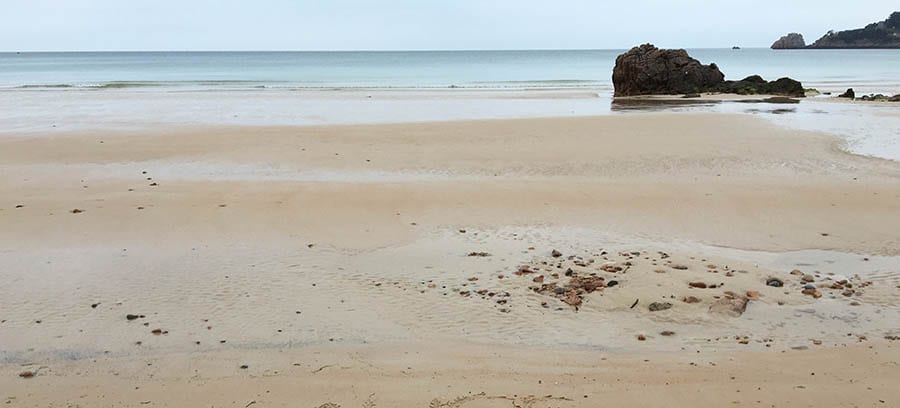
‘It’s not every day that you come across a beautiful village in the UK with its own motto, but Westward Ho! certainly has one – “Westward Ho!”. The name comes from a bestselling novel by Charles Kingsley’s, which perfectly fits the quaint little seaside village near Bideford in Devon.
When it comes to the best things to do in Westward Ho!, the biggest draw for tourists is the long stretch of sandy beach which runs for almost a mile towards the mouth of the Taw and Torridge rivers. The beach is family-friendly, and the gentle slope of sand makes it a perfect place for children to have a splash about in the waves. It’s also definitely not a beach where you’ll feel crowded as there’s so much space. The openness is honestly a relief compared to some of the other beaches in England.
If you continue along the beach, you’ll reach the SSSI (Site of Special Scientific Interest) of Northam Burrows. A great spot for nature enthusiasts, be sure to bring your binoculars as the 700 acres of salt marshes, grasslands and dunes are a hotspot for migrating birds. You’ll also find a small row of pastel-coloured beach huts at the end of the beach that just adds to the overall beauty of the scene.
It’s the perfect place to spend a weekend, but it’s also slightly hard to reach from London. To get there by train will take over 5 hours and involve a line change. Therefore, the best way to get there is by car. Admittedly it’s still a 4-hour drive, but you won’t be restricted by train times and will have much more control over your trip.
By Alice from Adventures of Alice
What does the word ‘coombe’ or ‘combe’ mean?
You may have noticed that several of the place names in Devon include ‘coombe‘ or ‘combe‘ in the name, but what does it actually mean?
A combe (/kuːm/; also spelt coombe or coomb and, in place names, comb) refers to a small valley that does not have water flowing through it. It can also mean a narrow, steep valley, or a small valley or large hollow on the side of a hill.
Places to stay in Devon
There is a diverse range of places to stay in Devon; hotels, guest houses, private rentals, campsites and even yurt to spend your holiday in Devon.
Map of the Best Weekends in Devon
Don’t forget to pin this article so you can come back to it later
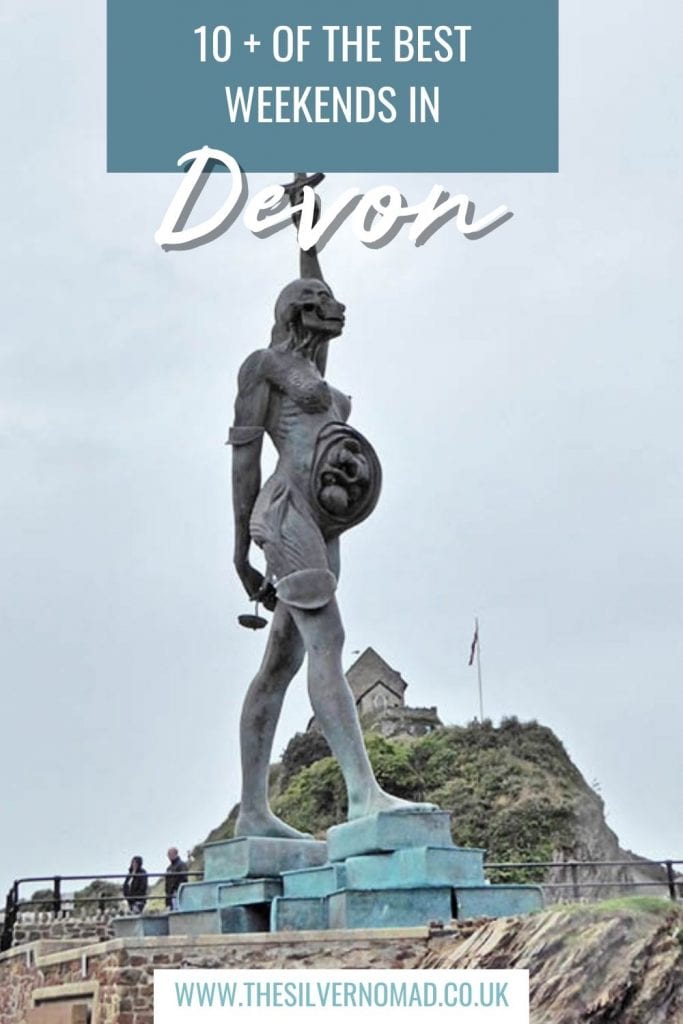

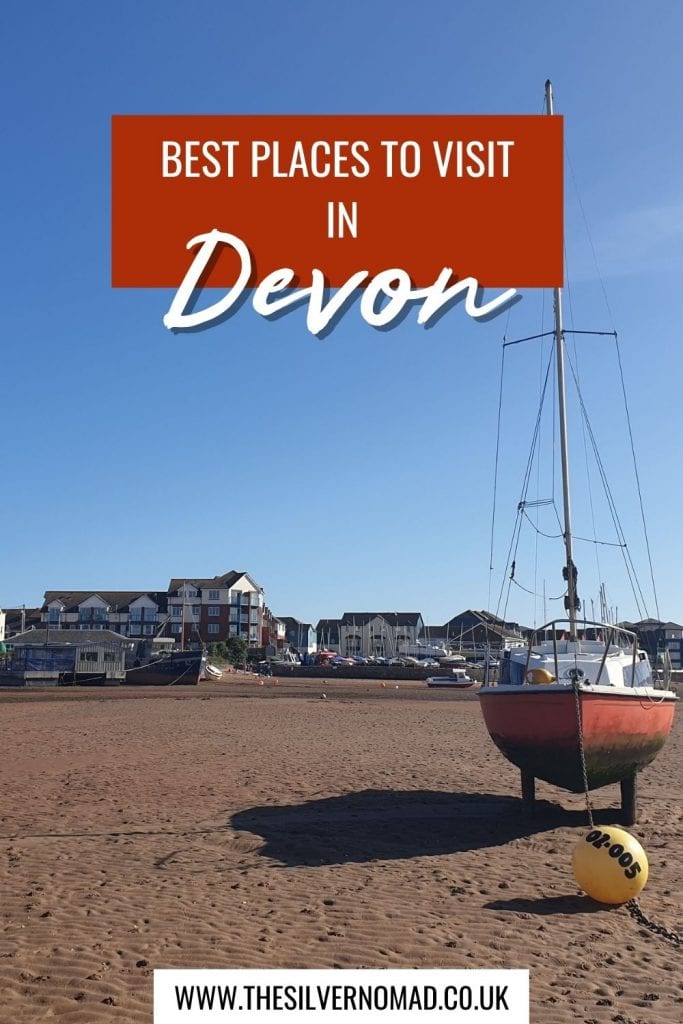

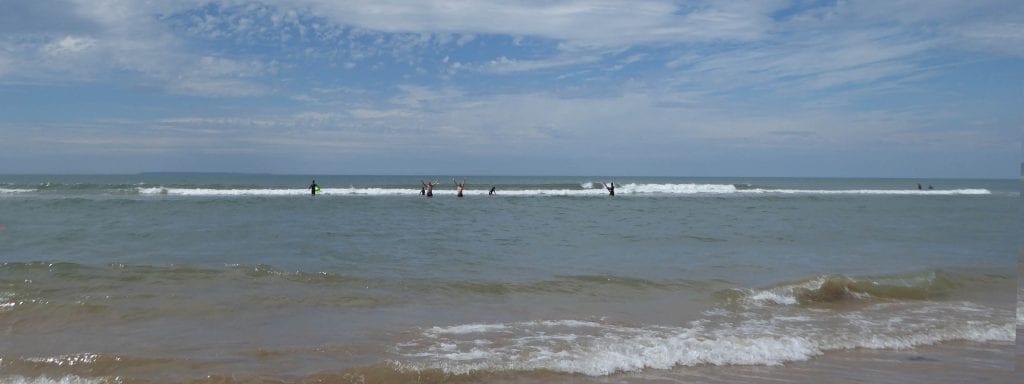
Clovelly looks really charming. It reminds me of Cape Cod in the USA. It’s what a fishing village should look like to me.
Clovelly is a traditional fishing village and very beautiful. I have not been to Cape Cod, I will add it to my long list!
Dartmouth is a fabulous destination in Devon, loved to see it on the list. All of the various places are great for visitors, especially for weekends. Thanks for pulling these great suggestions together!
I agree Dartmouth is a beautiful place, I hope to visit again soon.